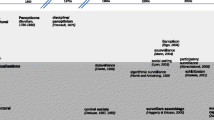Abstract
Efforts to analyse and describe the ever more salient phenomenon of private security have promoted the creation of certain neologisms, such as ‘parapolice’ and ‘quasipolice’, to capture the notion that this privatized, commodified variant of uniformed social control is not ‘police’ and must be contrasted with legitimate sources of governance. However, even though such critical insights are often accompanied by or in service to empirical investigations of private security, the focus of these has rarely been the perspectives of workers in private security, and their own specific orientations to themselves vis-a-vis police. Through inspection of open-ended interviews with 29 security officers, all employed in Canadian shopping malls, as well as analysis of narratives from online forums, this paper seeks to uncover how security personnel construe themselves relative to police. Findings suggest that interviewees recognize and appreciate fundamental differences between police and security, but also that they report, in nuanced and unanticipated ways, import overlaps and even interdependencies between their tasks and those of the police.
Similar content being viewed by others
References
Baker, C. (2004) Membership Categorization and Interview Accounts. In: D. Silverman (ed.) Qualitative Research: Theory, Method and Practice, 2nd edn., New York: Sage.
Bayley, D. and Bittner, E. (1984) Learning the skills of policing. Law and Contemporary Problems 1 (47): 35–59.
Bittner, E. (1967) Police discretion in emergency apprehension of mentally ill persons. Social Problems 14 (3): 278–292.
Button, M. (2003) Private security and the policing of quasi-public space. International Journal of the Sociology of Law 31 (3): 227–237.
Button, M. (2007a) Assessing the regulation of private security across Europe. European Journal of Criminology 4 (1): 109–128.
Button, M. (2007b) Security Officers and Policing: Powers, Culture and Control in the Governance of Private Space. Aldershot, UK: Ashgate.
Cukier, W., Quigley, T. and Susla, J. (2003) Canadian regulation of private security in an international perspective. International Journal of the Sociology of Law 31 (2): 239–265.
Fleming, J., Marks, M. and Wood, J. (2006) ‘Standing on the inside looking out’: The significance of police unions in networks of police governance. The Australian & New Zealand Journal of Criminology 39 (1): 71–89.
Fleury-Steiner, B. and Wiles, K. (2003) The use of commercial advertisements on public police cars in the United States, post 9/11. Policing and Society 13 (4): 441–450.
Forst, B. (2000) The Privatization and Civilianization of Policing. In: C.M. Friel (ed.) Boundary Changes in Criminal Justice Organizations. Washington, DC: U.S. Department of Justice.
Garfinkel, H. (1967) Studies in Ethnomethodology. Englewood Cliffs, New Jersey: Prentice-Hall.
Gilsinan, J. (1982) Doing Justice. Englewood Cliffs, NJ: Prentice Hall.
Heritage, J. (1984) Garfinkel and Ethnomethodology. Cambridge, UK: Polity.
Housley, W. (2000) Story, narrative and team work. The Sociological Review 48 (3): 425–443.
Jason-Lloyd, L. (2003) Quasi-Policing. London: Cavendish.
Johnston, L. and Shearing, C. (2003) Governing Security: Explorations in Policing and Justice. London: Routledge.
Manzo, J. (1996) Taking turns and taking sides: Opening scenes from two jury deliberations. Social Psychology Quarterly 59 (2): 107–125.
Manzo, J. (2006) ‘You Can't Rent a Cop’: Mall security officers' management of a ‘Stigmatized’ occupation. Security Journal 19 (3): 196–210.
Matoesian, G. (1993) Reproducing Rape: Domination through Talk in the Courtroom. Chicago: The University of Chicago Press.
Maynard, D. (1984) Inside Plea Bargaining: The Language of Negotiation. New York: Plenum Press.
Maynard, D. and Manzo, J. (1993) On the sociology of justice: Theoretical notes from an actual jury deliberation. Sociological Theory 11 (2): 171–193.
McLeod, R. (2002) Parapolice: A Revolution in the Business of Law Enforcement. Toronto: Boheme Press.
Nalla, M. and Hummer, D. (1999) Relations between police officers and security professionals: A study of perceptions. Security Journal 12 (1): 31–40.
Psathas, G. (1999) Studying the organization in action: Membership categorization and interaction analysis. Human Studies 22 (4): 139–162.
Rigakos, G. (1999a) Hyperpanotics as commodity: The case of the parapolice. Canadian Journal of Sociology 24 (3): 381–409.
Rigakos, G. (1999b) Risk society and actuarial criminology: Prospects for a critical discourse. Canadian Journal of Criminology 41 (2): 137–150.
Rigakos, G. (2000) Bubbles of governance: Private policing and the law in Canada. Canadian Journal of Law and Society 15 (1): 145–185.
Rigakos, G. (2002) The New Parapolice: Risk Markets and Commodified Social Control. Toronto: University of Toronto Press.
Schegloff, E. (2007) A tutorial on membership categorization. Journal of Pragmatics 39 (3): 462–482.
Shearing, C. (1996) Public and Private Policing. In: S. William, J. Mott and T. Newburn (eds.) Themes in Contemporary Policing. London: Policy Studies Institute.
Shearing, C. and Stenning, P. (1985) From the Panopticon to Disney World: The Development of Discipline. In: A. Doob and E. Greenspan (eds.) Perspectives in Criminal Law: Essays in Honour of John Ll. J. Edwards. Toronto: Canada Law Book.
Shearing, C. and Stenning, P. (1987) Private Policing. London: Sage.
Singh, A. (2005) Private security and crime control. Theoretical Criminology 9 (2): 153–174.
Skolnick, J. and Fyfe, J. (1993) Above the Law: Police and the Excessive Use of Force. New York: Free Press.
Travers, M. and Manzo, J. (1997) Law in Action: Ethnomethodological and Conversation-Analytic Approaches to Law. Aldershot, UK: Ashgate.
University of Pennsylvania Law Review (1972) Comment: Legal controls on neighborhood defense organizations. 120 (5): 952–982.
Watson, R. (1997) Some General Reflections on ‘Categorization’ and ‘Sequence’ in the Analysis of Conversation. In: S. Hester and P. Eglin (eds.) Culture in Action: Studies in Membership Categorization Analysis. Langham, MD: University Press of America.
Wieder, D. (1974) Language and Social Reality: The Case of Telling the Convict Code. The Hague: Mouton.
Wood, J. and Shearing, C. (2007) Imagining Security. Cullompton, UK: Willan Publishing.
Acknowledgements
This research was supported with funding from an SSHRC (Social Sciences and Humanities Research Council, Canada) standard research grant and with an URGC starter grant and SSHRC development award from the University of Calgary. A version of this paper was presented at the annual meetings of the American Society of Criminology, Los Angeles, November 2006. The author thanks Professor Bonnie Fisher, the anonymous reviewers, the interviewees, ASC attendees and research assistant Jesse Potts for their generous help in the production of this report.
Author information
Authors and Affiliations
Rights and permissions
About this article
Cite this article
Manzo, J. How private security officers perceive themselves relative to police. Secur J 23, 192–205 (2010). https://doi.org/10.1057/sj.2008.16
Published:
Issue Date:
DOI: https://doi.org/10.1057/sj.2008.16




